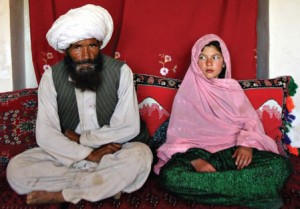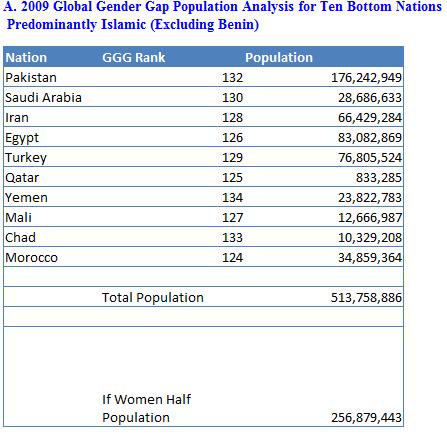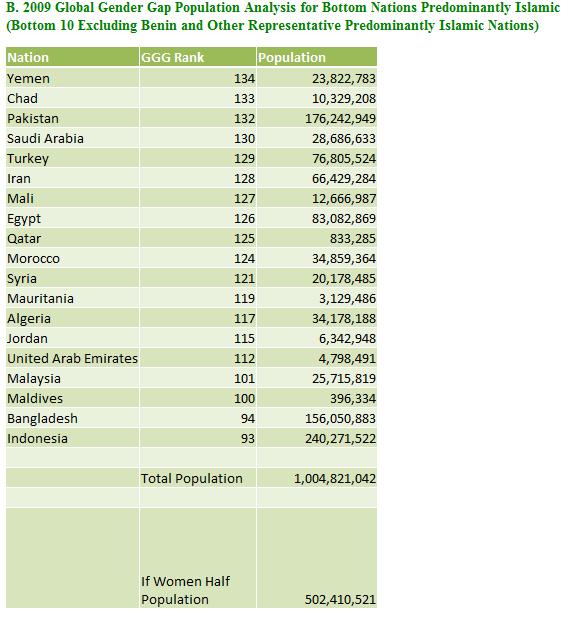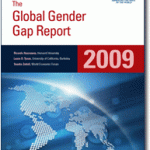The 2009 report by the World Economic Forum has listed predominantly Islamic nations in the bottom of their 2009 annual Global Gender Gap (GGG) Index. This included such major nations as Pakistan (ranked 132 out of 134), Saudi Arabia (ranked 130 out of 134), Iran (ranked 128 out of 134), Egypt (ranked 126 out of 134), and Turkey (ranked 129 out 134). Yemen, which is 99 percent Islamic, was the bottom ranked nation as 134 on the Global Gender Gap Index. The only nation not predominantly Islamic in the bottom of the Global Gender Gap index was Benin.
(NOTE: In “Updated Later Reports” below, R.E.A.L. has provided links to reports in later years for comparison purposes by other researchers.)
In addition, the 2009 World Economic Forum Global Gender Gap Index report does not include rankings on a number of significant and predominantly Islamic nations where women are oppressed. Somalia (population of nearly 10 million) was not included in the index. Endless numbers of reports of the stonings and extremist abuses of women have been reported in Somalia in the past year, including the stoning to death of a 13 year old girl based on “Sharia law” in October 2008. Sudan (population of nearly 41 million) was also not included in the World Economic Forum Global Gender Gap Index. Among other nations, Afghanistan (29 million) and Iraq (29 million) are also not included in this Global Gender Gap Index. With the index not reporting on these 109 million, the desperate fate of an estimated 50 plus million women are not included in this Global Gender Gap index report.
Even with these significant exclusions from the Global Gender Gap index report, the bottom 10 index nations (excluding Benin), which are all predominantly Islamic nations, represent a population of over half a billion individuals. These include Yemen (134 out of 134), Chad (133), Pakistan (132), Saudi Arabia (130), Turkey (129), Iran (128), Mali (127), Egypt (126), Qatar (125), Morocco (124). If women represent half of the population in these nations, then these bottom 10 predominantly Islamic nations demonstrate the ongoing oppression of an estimated 250 million women.
In addition, if some other predominantly Islamic nations in the bottom of the Global Gender Gap index are also added to these totals, the global image of the correlated oppression of women further expands dramatically. (Again, this is without such nations as Somalia, Sudan, Afghanistan, Iraq, etc., which were not included in the GGG index report analysis.)
If nine additional such nations in the GGG index are added, the total population impacted doubles from half a billion to over 1 billion. This would be the result of also considering the impact of Syria (121 out of 134), Mauritania (119), Algeria (117), Jordan (115), United Arab Emirates (112), Malaysia (101), Maldives (100), Bangladesh (94), and Indonesia (93). If women represent half of the population in these nations, then these bottom ranked, predominantly Islamic nations demonstrate the ongoing oppression of an estimated 500 million women.
All of the predominantly Islamic nations referenced in these calculations are members of the Organization of the Islamic Conference (OIC). The OIC rejects the Universal Declaration of Human Rights (UDHR), and has created its own version of a human rights document, “the Cairo Declaration of Human Rights” that stipulates that “All the rights and freedoms stipulated in this Declaration are subject to the Islamic Shari’a” and that “The Islamic Shari’a is the only source of reference for the explanation or clarification to any of the articles of this Declaration.” Human rights group Responsible for Equality And Liberty (R.E.A.L.) has protested U.S.-funded NGO’s working in “engagement” with the OIC without challenging this rejection of universal human rights. On October 26, 2009, the U.S. State Department’s 2009 Religious Freedom report was critical of the efforts of the OIC to undermine human freedoms.
In March 2009, IPS interviewed WEF’s Global Gender Gap (GGG) co-author Saadia Zahidi about the findings of these gender gap reports. In the IPS interview, the reporter asked Saadia Zahidi why wealthy nations such as Saudi Arabia and other Gulf states were not among the nations at the higher end of the gender gap index, quoting a previous GGG report that stated “rich countries have more education and health opportunities for all members of society.” In the IPS interview, Saadia Zahidi replied: “We don’t have an explanation for this. Some people, when they look at how we have broken this up, say it is so because of Islam. But I am not sure we can say that. With the lowest scores we see different countries with different incomes, religions and cultures. In the middle of the list, you have Indonesia (93), which is doing much better than Saudi Arabia (128), for example.”
In the March 2009 interview, Saadia Zahidi was referencing the 2008 report standings, as in 2009, Saudi Arabia is now ranked at 130 out of 134; Indonesia remains ranked at 93 out of 134, which WEF’s Saadia Zahidi views as the “middle of the list.”
The Global Gender Gap report makes no reference as to how the impact of extremist behavior and ideologies regarding women and equality in such nations have any role in such gender gaps.
The WEF “Women Leaders Partners” companies associated with the Global Gender Gap index study include: (a) Ernst & Young, whose Islamic Finance Service division is projecting a $7.7 billion Sharia insurance market by 2012, (b) Goldman Sachs that has been developing a global Sharia finance business over the past two years, and (c) NYSE Euronext that offers Sharia finance programs.
While there is emphasis on literacy issues as part of the gender gap oppression of women in the 2009 Global Gender Gap index report, the lower ranked nations in the Global Gender Gap index also included the predominantly (98.4 percent) Islamic Maldives (ranked 100 out of 134 in GGG index report), which has a 99 percent literacy rate. The Maldives government is developing a new criminal code based on Islamic Sharia law. In July 2009, reports stated that, under Maldives’ Sharia law, 150 women faced flogging for sexual activities in Maldives, including one 18-year old woman flogged 100 times until she collapsed. The United Nations Development Programme (UNDP) has been assisting the Maldives in expanding its Sharia-based criminal code.
The June 2009 U.S. State Department report on global human trafficking also shows a number of the nations in the bottom of the Global Gender Gap (GGG) index as nations with the worst records on human trafficking as well. (Note – a number of poorly ranked nations on human trafficking, such as Sudan, Afghanistan, Iraq, are simply not referenced in the GGG index.) The State Department report states that “According to the ILO, the majority of people trafficked for sexual exploitation or subjected to forced labor are female.”
Tier 3 Nations on Human Trafficking also in the bottom of the Global Gender Gap Index include:
– Saudi Arabia — GGG rank 130 out of 134
– Iran — GGG rank 128 out of 134
– Syria — GGG rank 121 out of 134
– Malaysia — GGG rank 101 out of 134
– Mauritania — GGG rank 119 out of 134
Tier 2 Watch List Nations on Human Trafficking also in the bottom of the Global Gender Gap Index include:
– Pakistan — GGG rank 132 out of 134
– Algeria — GGG rank 117 out of 134
– Yemen — GGG rank 134 out of 134
– United Arab Emirates — GGG rank 112 out of 134
– Egypt — GGG rank 126 out of 134
Tier 2 Nations on Human Trafficking also in the bottom of the Global Gender Gap Index include:
– Jordan — GGG rank 115 out of 134
– Turkey — GGG rank 129 out of 134

Image from State Dept 2009 Human Trafficking Report, section “Gender Imbalance in Human Trafficking”
Press Coverage on Global Gender Gap Report:
The Associated Press has reported on this survey that: “At the bottom of the list were Qatar, Egypt, Mali, Iran, Turkey, Saudi Arabia, Benin, Pakistan, Chad and Yemen in last place with a score of 46.1 per cent.” The AP report also quoted the World Economic Forum’s founder and executive chairman, Klaus Schwab, who stated: “Girls and women make up one half of the world’s population, and without their engagement, empowerment and contribution, we cannot hope to achieve a rapid economic recovery nor effectively tackle global challenges such as climate change, food security and conflict.”
Updated Later Reports
— World Economic Forum Global Gender Gap Report – 2017
(2017 Summary Web Site; Alternate Link)
— World Economic Forum Global Gender Gap Report – 2016
— World Economic Forum Global Gender Gap Report – 2015
— World Economic Forum Global Gender Gap Report – 2014
— World Economic Forum Global Gender Gap Report – 2013
— World Economic Forum Global Gender Gap Report – 2012
— World Economic Forum Global Gender Gap Report – 2011
— World Economic Forum Global Gender Gap Report – 2010
Report References and Resources:
— World Economic Forum Global Gender Gap Report – 2009
— October 28, 2009 Pakistan Daily Times: Pakistan among worst in gender equality
— Links to Key Gender Gap Country Profiles and Highlights
— 1. Gender Gap 2009 Report on Pakistan – Ranked 132 out of 134 Countries
— Pakistan – Islamic Republic, 96 percent Islamic
— Pakistan Population Estimate: 176,242,949
— 2. Gender Gap 2009 Report on Saudi Arabia – Ranked 130 out of 134 Countries
— Saudi Arabia – Islamic Absolute Monarchy, 97 percent Islamic
— Saudi Arabia Population Estimate: 28,686,633
— 3. Gender Gap 2009 Report on Iran – Ranked 128 out of 134 Countries
— Iran – Islamic Republic, 98 percent Islamic
— Iran Population Estimate: 66,429,284
— 4. Gender Gap 2009 Report on Egypt – Ranked 126 out of 134 Countries
— Egypt – 80 to 90 percent Islamic
— Egypt Population Estimate: 83,082,869
— 5. Gender Gap 2009 Report on Turkey – Ranked 129 out of 134 Countries
— Turkey – “the CIA World factbook states that 99.8% of Turkey’s population are nominally Muslims”
— Turkey Population Estimate: 76,805,524
— 6. Gender Gap 2009 Report on Qatar – Ranked 125 out of 134 Countries
— Qatar – 77 percent Islamic
— Qatar Population Estimate: 833,285
— 7. Gender Gap 2009 Report on Yemen – Ranked 134 out of 134 Countries
— Yemen – 99 percent Islamic
— Yemen Population Estimate: 23,822,783
— 8. Gender Gap 2009 Report on Mali – Ranked 127 out of 134 Countries
— Mali – 90 percent Islamic
— Mali Population Estimate: 12,666,987
— 9. Gender Gap 2009 Report on Chad – Ranked 133 out of 134 Countries
— Chad – 54 percent Islamic
— Chad Population Estimate: 10,329,208
— 10. Gender Gap 2009 Report on Morocco – Ranked 124 out of 134 Countries
— Morocco – 98.7 percent Islamic
— Morocco Population Estimate: 34,859,364
— 11. Gender Gap 2009 Report on Benin – Ranked 131 out of 134 Countries
— Benin – Predominantly Christian, 24 percent Islamic
— Benin Population Estimate: 8,791,832
— Other Nations of Concern that are predominantly Islamic:
— Syria – ranked 121 — population 20,178,485
— Mauritania – ranked 119 – population 3,129,486
— Algeria – ranked 117 — population 34,178,188
— Jordan – ranked 115 — population 6,342,948
— United Arab Emirates – ranked 112 – population 4,798,491
— Malaysia – ranked 101 — population 25,715,819
— Maldives – ranked 100 — population 396,334
— Bangladesh – ranked 94 — population 156,050,883
— Indonesia – ranked 93 — population 240,271,522



